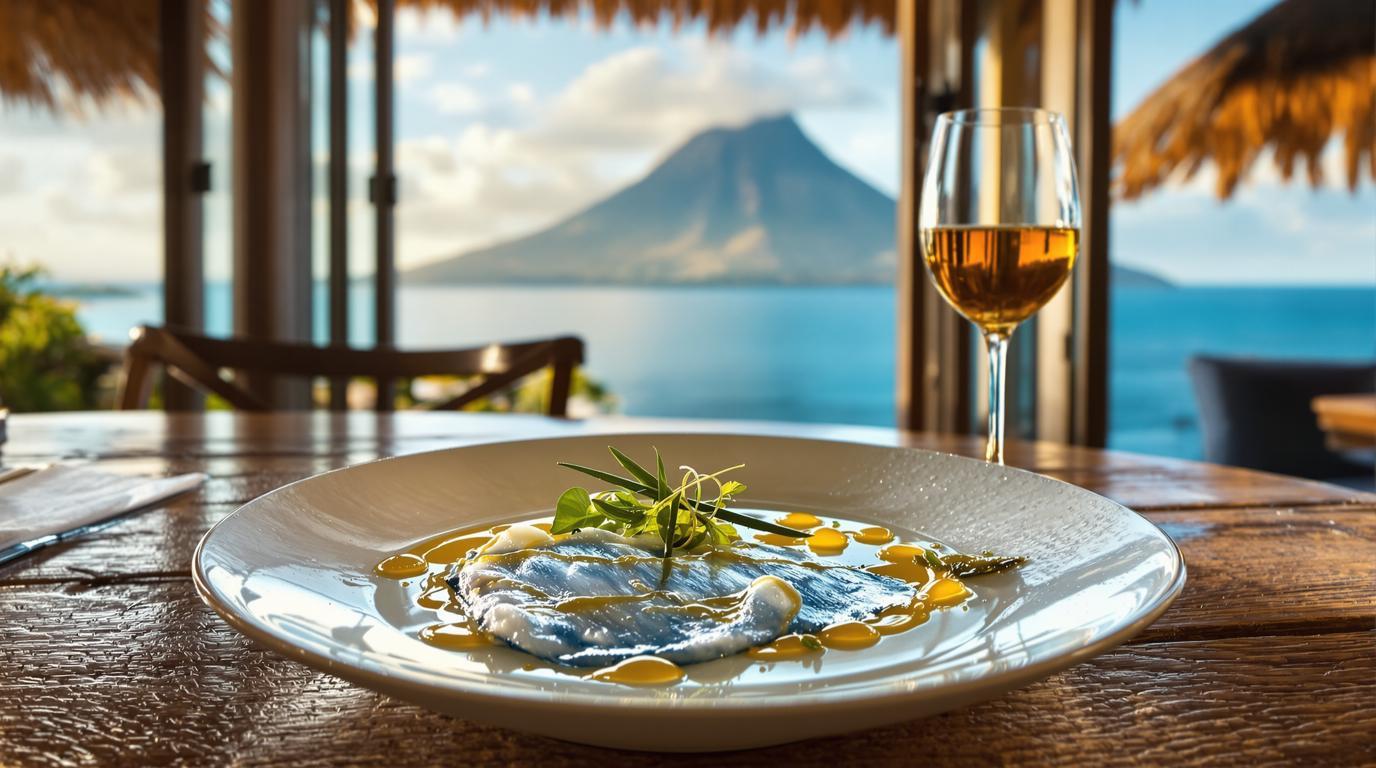Hidden culinary treasures await on a volcanic paradise that few Americans have discovered. La Réunion, France’s remote Indian Ocean department, offers a fusion gastronomy that rivals metropolitan France without a single Michelin star—yet the island’s innovative chefs are quietly creating a culinary revolution worth traveling 11,000 miles to experience.
A volcanic wonderland with French culinary soul
La Réunion sits like a verdant emerald in the Indian Ocean, dominated by the UNESCO-protected landscapes of its volcanic interior. While mainland France boasts impressive Michelin-starred restaurants, this tropical outpost offers something equally compelling: a culinary landscape where French technique meets African, Indian, and Chinese influences to create something entirely unique.
The blue marlin masterpiece of Saint-Leu
At Le Blue Margouillat in Saint-Leu, Chef Marc Chappot crafts elegant seafood dishes that would turn heads in Paris. This oceanside gem ranks among the 1000 best restaurants globally, with panoramic views of the Indian Ocean enhancing the experience. Their signature blue marlin carpaccio with vanilla oil perfectly represents the island’s fusion approach.
“Our cuisine tells the story of Réunion’s multiple heritages. We blend French techniques with local ingredients and global influences,” explains Chappot, whose dedication to island-sourced ingredients has earned international recognition.
Creole food that tells a cultural story
Les Nenettes in Saint-Paul offers authentic Creole recipes passed down through generations. Here, the rougail saucisse (spiced sausage stew) delivers a flavor complexity that rivals dishes from three-star establishments. Served in rustic clay pots amidst a garden setting, this is comfort food elevated to art form.
Hell-Bourg: The picturesque village with hidden culinary gems
The mountain village of Hell-Bourg, with its pastel colonial buildings and mist-shrouded surroundings, harbors unexpected gastronomic treasures. Like hidden abbey restaurants in Europe, these establishments require effort to reach but reward visitors with unforgettable meals infused with wild herbs gathered from the surrounding cirque.
The theatrical dining experience of Saint-Denis
L’Atelier de Ben creates an interactive culinary performance in the capital city. Here, chefs prepare locally-sourced ingredients tableside, transforming dinner into immersive entertainment. The volcanic soil produces vegetables with exceptional flavor intensity, showcased in their signature root vegetable trio with vanilla-scented foam.
Mediterranean meets Indian Ocean at Mediterraneo
Saint-Denis’ Mediterraneo brings a slice of Europe to this tropical paradise. Their wood-fired pizza oven creates perfectly blistered crusts topped with island-produced cheeses and locally-caught seafood. The result is a fascinating cross-cultural experience that feels both familiar and exotic.
“Réunion’s terroir deserves recognition from culinary guides,” notes celebrated French chef Thierry Marx after a recent visit. “The island’s unique ingredients and multicultural approach create dining experiences impossible to replicate elsewhere.”
The sunset dining experience that rivals Zadar’s Sea Organ
While Croatia’s Zadar is famous for sunset views, La Réunion’s west coast offers equally spectacular dining vistas. Beachfront restaurants in Saint-Gilles-les-Bains provide front-row seats to the Indian Ocean’s nightly color display while serving fresh-caught wahoo and dorado.
A journey across flavors worth traversing oceans
Like passengers on North America’s most spectacular train journeys, travelers to La Réunion embark on a transformative experience. The island’s cuisine—blending French tradition, Creole soul, and Asian precision—offers a gastronomic adventure unparalleled in the Indian Ocean.
La Réunion may lack Michelin stars, but its volcanic landscapes and multicultural kitchens produce flavors that burn into memory. This distant French department proves that sometimes the most extraordinary culinary destinations are those waiting to be discovered, where innovation happens far from the spotlight but with no less brilliance or passion.
